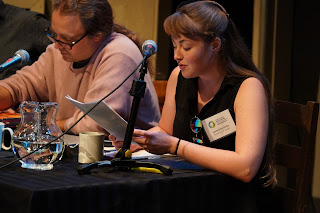This was my third trip to Guelph since finally understanding that it was not in Lombardy and was never the home of Henry the Black. This was also the first time I drove up from Penn State, now that I have finally learned driving there is quicker than air travel.
The Guelph Jazz Festival is the only one that has a scholarly colloquium on improvisation. These discussions are sponsored by the International Institute for Critical Studies in Improvisation, directed by Ajay Heble, who has also just recently relinquished the heavy duties of organizing the musical performances. I was there to speak on a panel on Free Jazz / Free Verse with my good colleague from Quebec City, Jean Philippe Marcoux. I was also there to hear Matthew Shipp again!
Peter Brotzmann walks away from it all.
This year's panel also reunited me with Rob Wallace, a fine drummer and even finer scholar.
Always eclectic, the Guelph festival this year brought us a concert of Persian improvisatory music.
That Matthew Shipp's concerts were breath-taking was no surprise, though his music constantly surprised. What did come as a surprise to me was the performance of the Peggy Lee Octet. I'd heard Lee on cello in various configurations, but this night was given to a presentation of her wonderful compositions under the sign of "Film out of Music." The Octet played Lee's "Tell Tale Suite" in its entirety, and it was in fact cinematic. The addition of a violin to her ensemble has made possible some powerful passages.
Another surprise was Rene Lussier's Meuh. Lussier is a brilliant guitarist from Quebec (nice Les Paul there), but the music that Sunday afternoon was like nothing else on the program; it was also the only ensemble featuring a lap steel player. The best description I can give of this concert is to call it demented country western. Imagine western swing tormented to within an inch of its life with angular rhythms and odd chords entering and departing unexpectedly. In this photo you can just make out a microphone aimed at the stage. Lussier was contributing foot percussion throughout. Not simply tapping a foot, mind you, but using both shoes to set up rhythms. (I remembered Spider John Koerner being credited for twelve string guitar and foot.)







































































